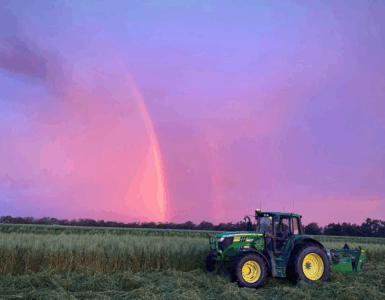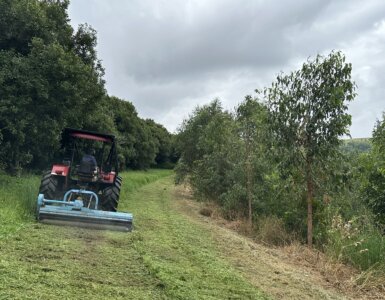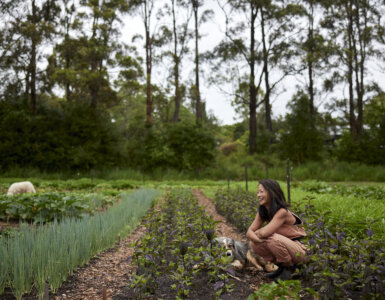She’s a farmer, agronomist, mum and a big part of her local Warren community. And from driving programs to restock native fish in her beloved Macquarie river, to lobbying for funding for a new skate park in town, school fundraisers and even the formation and management of a ‘drought band’ that aimed to (and did) lift spirits and provide entertainment during the worst of those dry years (The Dusty Rain Gauges, and apparently they aren’t half bad!) – she really does get things done.
And not only is Amanda a gun organiser, she’s also one of her industry’s best communicators, working hard to debunk and address much of the criticism and confusion that can swirl around cotton farming, a farming sector she has been a part of for over 20 years now.
Amanda and her husband Ben run both dryland (for example chickpeas , barley, oats, canola and wheat) and an irrigated farming business. They also have cattle (or did before destocking during the drought – though this side of things is just starting back up again) and a trucking company that uses the workers from the farm when things are quiet on that front.
Plus she has a part time job four days a week as an research agronomist and extension officer with CottonInfo, an industry body connecting farmers with the latest research and innovation and helping them implement these on farm. Also, she’s a mum of three.
Did we mention she’s a force of nature?
“There’s just so much confusion out there about cotton,” Amanda says.
“It breaks my heart to know that so much inaccurate information is being shared on social media, and then it’s read and believed by good people who just want what’s best for the environment. That’s why I step up to tell the real story.”
Basically, it all starts and ends with this:
Good cotton farmers care deeply about our rivers, they are the lifeblood of our communities and everything we do revolves around keeping them healthy”.
Amanda proves this point on a golden evening in the early September just gone. We are on their farm, by the banks of a horseshoe bend in the Macquarie river. To our left, wheat fields stretch out for miles waving their tall green heads as if proudly acknowledging that they are part of one of the best crops in a at least five years.
And then, to the right we see her sons and their friends fishing for Yellow Belly and Murray Cod, carefully catching and releasing as they go. In between crop and river is a small group sitting around a campfire. A tight bunch of famers and families from across the district who have come together for a good catch up and feed.
And about that; together Amanda and Ben are also excellent camp cooks! They work together loading coals into shallow holes of earth, creating shallow ovens upon which sit huge cast iron pots, one containing a crazy-aromatic lamb shank casserole, while in another a pile of potatoes and pumpkins are sizzling away on on a bed of rosemary.
It’s a delicious meal, made even more special because of the mild spring night and the soft sounds of the river behind us. And of course, everyone knows that food tastes better by a campfire!
After dinner, the fishing rods are packed away and everyone is co-opted into a fireside game of charades. Organised of course by Amanda. In minutes she has the group – from dancing four-year-old girls to forty-year-old agronomists – all playing together and with great humour. It’s a joyful scene.
Cotton farmers like the families at our picnic often taking a hammering in social and mainstream media for what they do. So Amanda and her peers regularly step up to talk about their industry, they cover water use, explain how allocations work and point out that cotton farmers can’t just take water from the river whenever they feel like it; “we pay for a water license and that license allows gives us the potential to use water, we can only access these licences once the state governments after water for the environment and critical human needs has been prioritised, so unless we are in flood we don’t often get access to the full amount of the licence”.
Amanda goes on to explain that the great thing about cotton is that it’s not a permanent crop, so farmers can grow it when water is available and not plant when the water is not.
We also make a point to explain that 90% of cotton farmers are small family agribusinesses like ours.
“And those farms that are corporates still employ many families and contribute significantly to the small communities in which they are located”.
A huge amount of planning and consideration goes into every cotton crop. And with her agronomist and CottonInfo hat on, Amanda also tells of the many innovations and improvements that have come into cotton farming via research and variety management, “all of this means our water and chemical uses are ever decreasing,” she says.
For example, Australian cotton farmers have cut the amount of water needed to produce one bale of cotton by half in just 20 years (one bale makes around 215 pairs of jeans), and chemical use is constantly being reduced.
It’s not just improving the way they farm that occupies Amanda and her family’s time and thoughts; during the recent drought they also worked hard to protect and grow their beloved river’s fish populations.
“As the drought started to grab hold” she says, “the river levels were dropping and we started to think about how we could better protect and improve our river country and promote a more diverse habitat for the fish population.”
The most obvious thing to do was fence off the river access to our stock and set up troughs as watering points to stop the cattle wandering down to the riverbank and impacting on the native vegetation and muddling the water.
So she and Ben organised some funding to do this fencing and it had an almost immediate impact on the riparian zones of their property. Riparian zones are the vulnerable riverbank areas which are really important for the whole river. Their health translates to cleaner water, less disease and pests and more nutrient rich soil. And without cattle treading all over this vulnerable little ecosystem, it began to thrive again.
In just two years, they started to see results, “we could see that the fish were breeding and were catching lots of different sized Murray cod and Golden Pearch .”
They also initiated a catch and release program. “Around this time, the drought was getting worse and my husband Ben and son Archie, both very keen anglers, became even more concerned about the fate of our native fish population, not just the fish but the yabbies, turtles, mussels and other critters that live in this ecosystem”.
So they got in touch with the local DPI Fisheries and applied for a permit to move some of the species that were really struggling with the receding water and rising temperatures and move them to better water or to the fisheries centre where they were used as breading stock, some of which will be retuned to the location that they were removed from.
It was a mammoth effort, not only on the part of the Thomas family but over 15 volunteers and a crew of fisheries’ staff. But in the end, a total of 226 native fish were rescued and relocated.
“It made those harsh drought years a bit more bearable to know we were part of something so positive,” Amanda reflects, “drought can make you feel so helpless but here at least, we achieved something good.”
And then, early this year the drought began to ease off. Autumn rains came and the river rose. Winter cereal, pulse and oil crops shot up and the whole district seemed to breathe a sigh of relief.
“Here’s fingers crossed to a good finish to this season, inflows into our dams and more moves towards restoring the beautiful rivers that our the lifeblood of our communities.”
And here’s fingers crossed that more farmers
like Amanda step up to tell the good stories of agriculture across the country,
answering questions, addressing the issues and keeping the conversations going.
If only they could all be had over one of her camp oven feasts by the banks of
that beautiful river.















































Add comment